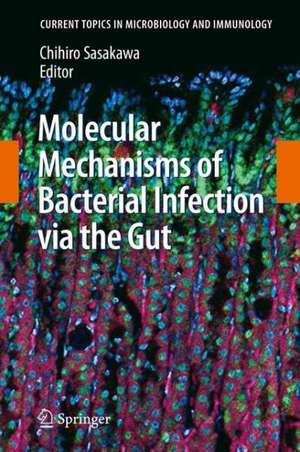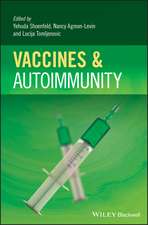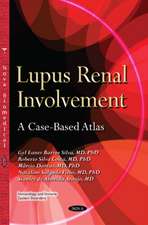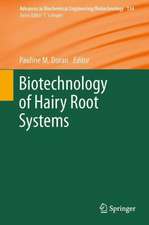Molecular Mechanisms of Bacterial Infection via the Gut: Current Topics in Microbiology and Immunology, cartea 337
Editat de Chihiro Sasakawaen Limba Engleză Paperback – 14 mar 2012
The authors offer an overview of the current topics related to major gastric and enteric pathogens, while highlighting their highly evolved host (human)-adapted infectious processes. Clearly, an in-depth study of bacterial infectious strategies, as well as the host cellular and immune responses, presented in each chapter of this book will provide further insight into the critical roles of the host innate and adaptive immune systems and their importance in determining the severity or completely preventing infectious diseases. Furthermore, under the continuous threat of emerging and re-emerging infectious diseases, the topic of gut-bacteria molecular interactions will provide various clues and ideas for the development of new therapeutic strategies.
| Toate formatele și edițiile | Preț | Express |
|---|---|---|
| Paperback (1) | 1092.99 lei 6-8 săpt. | |
| Springer Berlin, Heidelberg – 14 mar 2012 | 1092.99 lei 6-8 săpt. | |
| Hardback (1) | 1098.48 lei 6-8 săpt. | |
| Springer Berlin, Heidelberg – 28 oct 2009 | 1098.48 lei 6-8 săpt. |
Din seria Current Topics in Microbiology and Immunology
- 18%
 Preț: 962.03 lei
Preț: 962.03 lei - 5%
 Preț: 1123.13 lei
Preț: 1123.13 lei -
 Preț: 499.76 lei
Preț: 499.76 lei - 5%
 Preț: 967.79 lei
Preț: 967.79 lei - 18%
 Preț: 1118.62 lei
Preț: 1118.62 lei - 5%
 Preț: 717.00 lei
Preț: 717.00 lei - 5%
 Preț: 712.97 lei
Preț: 712.97 lei - 5%
 Preț: 709.51 lei
Preț: 709.51 lei - 5%
 Preț: 709.51 lei
Preț: 709.51 lei - 5%
 Preț: 721.19 lei
Preț: 721.19 lei - 5%
 Preț: 359.78 lei
Preț: 359.78 lei - 5%
 Preț: 711.88 lei
Preț: 711.88 lei - 5%
 Preț: 774.81 lei
Preț: 774.81 lei - 15%
 Preț: 640.06 lei
Preț: 640.06 lei - 5%
 Preț: 717.00 lei
Preț: 717.00 lei - 5%
 Preț: 360.34 lei
Preț: 360.34 lei - 5%
 Preț: 707.69 lei
Preț: 707.69 lei - 5%
 Preț: 717.56 lei
Preț: 717.56 lei - 5%
 Preț: 716.28 lei
Preț: 716.28 lei - 5%
 Preț: 717.20 lei
Preț: 717.20 lei - 5%
 Preț: 711.32 lei
Preț: 711.32 lei - 5%
 Preț: 711.88 lei
Preț: 711.88 lei - 5%
 Preț: 718.29 lei
Preț: 718.29 lei - 5%
 Preț: 709.51 lei
Preț: 709.51 lei - 5%
 Preț: 369.84 lei
Preț: 369.84 lei - 5%
 Preț: 712.25 lei
Preț: 712.25 lei - 5%
 Preț: 716.45 lei
Preț: 716.45 lei - 5%
 Preț: 706.60 lei
Preț: 706.60 lei - 5%
 Preț: 711.52 lei
Preț: 711.52 lei - 5%
 Preț: 713.54 lei
Preț: 713.54 lei - 5%
 Preț: 720.47 lei
Preț: 720.47 lei - 5%
 Preț: 725.42 lei
Preț: 725.42 lei - 5%
 Preț: 708.06 lei
Preț: 708.06 lei - 5%
 Preț: 713.70 lei
Preț: 713.70 lei - 5%
 Preț: 705.83 lei
Preț: 705.83 lei - 5%
 Preț: 710.96 lei
Preț: 710.96 lei - 5%
 Preț: 723.93 lei
Preț: 723.93 lei - 5%
 Preț: 707.69 lei
Preț: 707.69 lei - 5%
 Preț: 715.35 lei
Preț: 715.35 lei - 5%
 Preț: 709.87 lei
Preț: 709.87 lei - 5%
 Preț: 359.05 lei
Preț: 359.05 lei - 5%
 Preț: 374.20 lei
Preț: 374.20 lei - 15%
 Preț: 635.31 lei
Preț: 635.31 lei - 5%
 Preț: 707.86 lei
Preț: 707.86 lei - 5%
 Preț: 721.96 lei
Preț: 721.96 lei - 15%
 Preț: 632.88 lei
Preț: 632.88 lei - 15%
 Preț: 632.05 lei
Preț: 632.05 lei - 15%
 Preț: 642.83 lei
Preț: 642.83 lei - 5%
 Preț: 709.14 lei
Preț: 709.14 lei
Preț: 1092.99 lei
Preț vechi: 1150.52 lei
-5% Nou
Puncte Express: 1639
Preț estimativ în valută:
209.17€ • 216.08$ • 174.08£
209.17€ • 216.08$ • 174.08£
Carte tipărită la comandă
Livrare economică 25 martie-08 aprilie
Preluare comenzi: 021 569.72.76
Specificații
ISBN-13: 9783642261121
ISBN-10: 3642261124
Pagini: 272
Ilustrații: XII, 260 p. 22 illus., 13 illus. in color.
Dimensiuni: 155 x 235 x 14 mm
Greutate: 0.39 kg
Ediția:2009
Editura: Springer Berlin, Heidelberg
Colecția Springer
Seria Current Topics in Microbiology and Immunology
Locul publicării:Berlin, Heidelberg, Germany
ISBN-10: 3642261124
Pagini: 272
Ilustrații: XII, 260 p. 22 illus., 13 illus. in color.
Dimensiuni: 155 x 235 x 14 mm
Greutate: 0.39 kg
Ediția:2009
Editura: Springer Berlin, Heidelberg
Colecția Springer
Seria Current Topics in Microbiology and Immunology
Locul publicării:Berlin, Heidelberg, Germany
Public țintă
ResearchCuprins
Functional Morphology of the Gastrointestinal Tract.- Vibrio cholerae Interactions with the Gastrointestinal Tract: Lessons from Animal Studies.- Interaction of Yersinia with the Gut: Mechanisms of Pathogenesis and Immune Evasion.- Molecular Mechanisms of Salmonella Virulence and Host Resistance.- Virulence Mechanisms and Persistence Strategies of the Human Gastric Pathogen Helicobacter pylori.- Listeria as an Enteroinvasive Gastrointestinal Pathogen.- Molecular Mechanisms of Campylobacter Infection.- Shigella Infection of Intestinal Epithelium and Circumvention of the Host Innate Defense System.
Textul de pe ultima copertă
Our gut is colonized by numerous bacteria throughout our life, and the gut epithelium is constantly exposed to foreign microbes and dietary antigens. Thus, the gut epithelium acts as a barrier against microbial invaders and is equipped with various innate defense systems. Resident commensal and foreign invading bacteria interact intimately with the gut epithelium and can impact host cellular and innate immune responses. From the perspective of many pathogenic bacteria, the gut epithelium serves as an infectious foothold and port of entry for disseminate into deeper tissues. In some instances when the intestinal defense activity and host immune system become compromised, even commensal and opportunistic pathogenic bacteria can cross the barrier and initiate local and systematic infectious diseases. Conversely, some highly pathogenic bacteria, such as those highlighted in this book, are able to colonize or invade the intestinal epithelium despite the gut barrier function is intact. Therefore, the relationship between the defensive activity of the intestinal epithelium against microbes and the pathogenesis of infective microbes becomes the basis for maintaining a healthy life.
The authors offer an overview of the current topics related to major gastric and enteric pathogens, while highlighting their highly evolved host (human)-adapted infectious processes. Clearly, an in-depth study of bacterial infectious strategies, as well as the host cellular and immune responses, presented in each chapter of this book will provide further insight into the critical roles of the host innate and adaptive immune systems and their importance in determining the severity or completely preventing infectious diseases. Furthermore, under the continuous threat of emerging and re-emerging infectious diseases, the topic of gut-bacteria molecular interactions will provide various clues and ideas for the development of new therapeutic strategies.
The authors offer an overview of the current topics related to major gastric and enteric pathogens, while highlighting their highly evolved host (human)-adapted infectious processes. Clearly, an in-depth study of bacterial infectious strategies, as well as the host cellular and immune responses, presented in each chapter of this book will provide further insight into the critical roles of the host innate and adaptive immune systems and their importance in determining the severity or completely preventing infectious diseases. Furthermore, under the continuous threat of emerging and re-emerging infectious diseases, the topic of gut-bacteria molecular interactions will provide various clues and ideas for the development of new therapeutic strategies.










